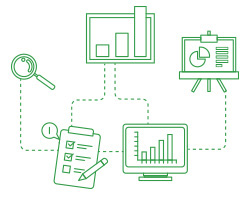For any company engaged in an external audit, there’s always a sense that leadership is holding their breath – just waiting to hear of an uncovered non-compliance or discrepancy that’s going to cost time and money to resolve.
As highly experienced external auditors, delivering bad news to a client is not something we enjoy. In a perfect world, every organisation would have flawless records underpinned by 5-star controls and processes.
However, in a medium to large enterprise with potentially thousands of staff, this can often seem impossible to achieve. Human error, inconsistent practices, or intentional circumvention inevitably leads to faults and it’s not until the external audit process unfolds after year end that these issues may be brought to light. 
Fortunately, there is audit technology emerging which has the potential to tackle these challenges head-on and provide next-level assurance for senior executives and boards.
What is continuous auditing?
Imagine an intelligent system that is capable of overseeing (but without disturbing) your business’s critical systems. One that continuously validates every input against any set of compliance requirements to enable real-time identification and rectification of issues.
Known as continuous auditing, this is a very real capability and is set to revolutionise audit and assurance for organisations in both the public and private sectors.
Leveraging the latest in data analytics and machine learning, continuous auditing is a valuable extension of external auditing as it allows your auditor to manage risk more effectively on your behalf. Rather than waiting months to identify and flag concerns, such as unauthorised transactions or duplicate payments, your auditor will be alerted to them instantly and can raise them with you before they become more serious or systemic.
How does continuous auditing work?
As an adjunct to annual financial reporting and auditing requirements, continuous auditing does not replace an external audit but can significantly streamline the process.
It uses various technologies and software which connect to your key systems and establish 24/7 monitoring based on explicit inputs. These inputs can be tailored to meet the specific regulatory obligations that apply to your business, and even enhanced to include internal policies and controls that form part of your standard auditing process.
Because it is an autonomous system, the technology is not compromised by human input. It simply analyses data based on a set of parameters and serves up insights via a dashboard to keep your auditor informed.
With automated flagging of discrepancies, continuous auditing means:
- Issues can be resolved in a timely manner
- The annual audit process is more streamlined
- Leadership gains unprecedented assurance of ongoing compliance
- The business saves time and money by not having to rectify past inconsistencies
When can I implement continuous auditing?
At RSM, we’ve been keeping a close eye on the emerging capability in this space to identify the best possible software solutions for continuous auditing.
We understand the criticality in selecting the most advanced and robust solutions which encompass optimal features without the challenges that are often associated with inaugural models.
FOR MORE INFORMATION
To learn more about continuous auditing, please contact your nearest RSM office or Louis Quintal on (02) 8226 4692.





